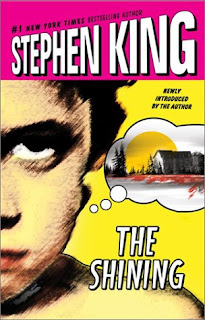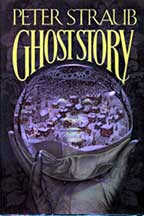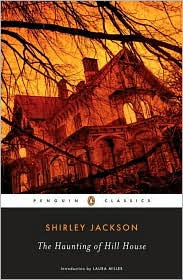
Of course it's all fake.
The hauntings that occur in The Amityville Horror are so reliable and violent and...well...obvious that it would left the fringe-y world of parapsychology and become the darling of the scientific community. Things fly, devil pigs talk to children, bugs fill rooms for no reason, stuff flies around and crashes like a low-rent air show. It's all very dramatic and impressive and I'm absolutely mystified that anyone took this book seriously.

I came into The Amityville Horror knowing it was bunk. Besides my natural and intense skepticism, I have a friend who is very active in the skeptic and debunking community. He sent me a bunch of articles and podcasts dealing with the Warrens, paranormal investigators who sound like a couple of crass opportunists, and George Lutz, the homeowner who sounds like a crass opportunist with a screw loose. Before I opened page one, I knew I was dealing with a work of fiction.
Strangely enough, that made the book more palatable.
A lot of horror tales boldly declare they're based on trues stories. It's a part of ghost stories. "We're just down the way from where that girl scout with the lazy eye and hare lip killed the rest of her troupe with a lacrosse stick" or whatever variation you'd care to hear. It lends veracity to the tale, as well as chillingly suggests that it could happen again.
So, whatever. You wanna say you're a true account? Oooookay. I'll be your huckleberry.

The core problem with The Amityville Horror is that it tries to have it's cake and eat it too.
The book tells a lurid story. Mass murders, cursed priests, satanic malevolence, and all that good EC comics stuff makes for a great ghastly tale. Unfortunately, the book reads like it's trying to maintain the pretense of straightforward journalism. Part of it is due to the weaknesses of Jay Anson's style, which can be politely described as leaning toward the hyperbolic. Part of it is due to the fact that it's not really structured like a linear narrative. It's more a series of vignettes. Every chapter is essentially a self-contained story. A bunch of spooky shit happens, the parents act like utter cocks, the priest wheedles and moans and bitches out again, and something really scary happens and a bunch of exclamation points start sprouting on the page like mushrooms on a dry old turd. Not to trash too hard on the man's efforts, which had some nifty imagery and works as a fun beach towel/bedside table book, but it's not much of a narrative.
The only real character is the priest. The parents are sketched out so vaguely that I can't tell if their rising temper at each other and their kids is due to supernatural malevolence or simple bridge-and-tunnel douchebaggery. The priest gets the most pages and most of them portray a cowardly, indecisive Hamlet, forever vacillating on whether or not to help the family and passing off responsibility by appealing to his conservative superiors. Frankly, he comes off like a punk. Fuck that guy.
Speaking of which, I'm noticing a theme in these books.
Between this and Grave's End which is another true life account of the supernatural, I can't help but notice something in the inhabitants of these haunted houses. Both of the books deal with deeply religious people and I can't help but believe people with a strong attachment to believing in gods don't have much of a problem making a jump to believing in ghosts.
Just sayin'.

The movie was much better.
In describing The Amityville Horror in his seminal non-fiction book on the genre, Stephen King called it one of the first "economic horror stories." Think about it. You buy a new house that should be waaaaay out of your price range, you make some rough peace with the fact that people died horribly in there, then you move in and the pipes fill up with black oil and doors rip of their frames and rooms fill up with bugs and the nastiness just keeps escalating. You can't really deal with a fixer-upper when it is actively working against you.
It kinda made sense to me as a kid but it makes a whole lot more sense now. A week ago, I moved into a new apartment in Bushwick. I'm just another hipster kid gentrifying a neighborhood, but it's hard work building a home. It's a tiny room in a basement that was never meant to house people. There is no ventilation in the place, there is no closet, my stuff doesn't fit in the room, the stove barely works, and there's a bunch of teenagers running a craps game going on in front of my place. Yet somehow I gotta make it work. And it's much easier than if some dead asshole started turning over my furniture and knocking over the cheap ass canvas wardrobe I had to buy to keep my stuff.
The movie focuses on that aspect of the tale. The priest is barely in the movie, the family is likable, the performances are good, and shit gets real intense.
Watch the movie. Skip the book.






































